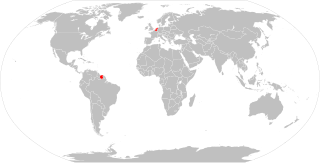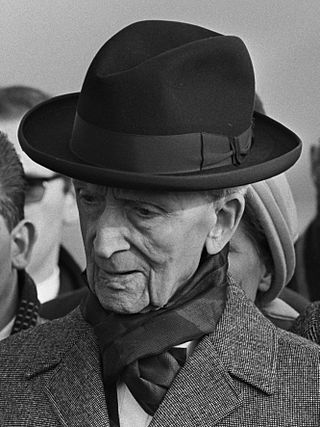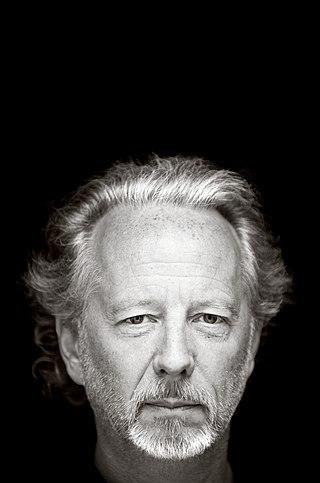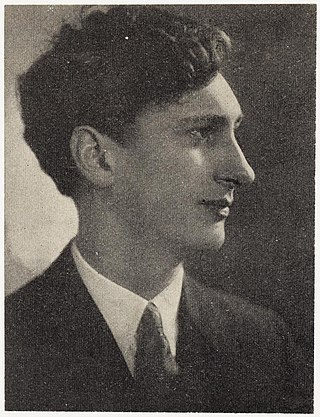
The Dutch Language Union is an international regulatory institution that governs issues regarding the Dutch language. It is best known for its spelling reforms which are promulgated by member states, grammar books, the Green Booklet and its support of Dutch language courses and studies worldwide. It was founded on a treaty concluded between the Netherlands and Belgium on 9 September 1980. Suriname has been an associate member of the Taalunie since 2004.
The Royal Academies for Science and the Arts of Belgium (RASAB) is a non-governmental association that promotes and organises science and the arts in Belgium by coordinating the national and international activities of its constituent academies such as the National Scientific Committees and the representation of Belgium in international scientific organisations.
Royal Academy may refer to:

Jean Joseph Camille Huysmans was a Belgian politician who served as the prime minister of Belgium from 1946 to 1947.

Cyrillus Gustave Emile "Cyriel" Buysse was a Flemish naturalist author and playwright. He also wrote under the following pseudonyms: Louis Bonheyden, Prosper Van Hove and Robert Palmer.

Herman Louis Cesar Teirlinck was a Belgian writer. He was the fifth child and only son of Isidoor Teirlinck and Oda van Nieuwenhove, who were both teachers in Brussels. As a child, he had frail health and spent much of his time at the countryside in Zegelsem, with his paternal grandparents. He was nominated for the Nobel Prize in Literature six times.

Julius Hoste Jr. (1884–1954) was a Belgian businessman and liberal politician.

The Academy Palace or Palace of the Academies is a neoclassical palace in Brussels, Belgium. It was originally built between 1823 and 1828 for Prince William II of Orange. Nowadays, it houses five Belgian academies including the Royal Academies for Science and the Arts of Belgium (RASAB). In English, it is also often called the Academy House.

Stefan Hertmans is a Flemish Belgian writer. He was head of a study centre at University College Ghent and affiliated researcher of the Ghent University. He won the Ferdinand Bordewijk Prijs in 2002 for the novel Als op de eerste dag.

Maurice, Baron Gilliams was a Flemish writer and poet.
The Royal Academy of Fine Arts of Ghent is an art school that is one of the oldest art schools in Belgium. It is a part of the Hogeschool Gent, a Belgium University college.
Maurits Gysseling was an influential Belgian researcher into historical linguistics and paleography. He was especially well known for his editions and studies of old texts relevant to the history of the Dutch language, and also for his very detailed analyses of historical place-names and their probable origins.

The Royal Flemish Academy of Belgium for Science and the Arts is an independent learned society of science and arts of the Flemish Community in Belgium. It is one of Belgium's numerous academies and traces its origin to 1772 when the Imperial and Royal Academy of Brussels was founded by empress Maria Theresia.
The Royal Academy of Science, Letters and Fine Arts of Belgium is the independent learned society of science and arts of the French Community of Belgium. One of Belgium's numerous academies, it is the French-speaking counterpart of the Royal Flemish Academy of Belgium for Science and the Arts. In 2001 both academies founded a joint association for the purpose of promoting science and arts on an international level: The Royal Academies for Science and the Arts of Belgium (RASAB). All three institutions are located in the same building, the Academy Palace in Brussels.

René Tavernier was a Belgian geologist and stratigrapher. He was a professor at the State University of Ghent, a corresponding member of the Royal Flemish Academy of Belgium for Science and the Arts, and one of the founders of the Belgian Society for Soil Science.
Gerard Isaäc Lieftinck, known in print as G.I. Lieftinck, was a Dutch academic specialising in medieval European manuscripts.

In Belgium, academies are publicly funded learned societies, often divided by academic discipline or linguistic group. Besides holding meetings, many publish academic monographs, peer-reviewed journals and hold conferences. Membership is usually by election and non-Belgians are usually admitted only as corresponding members. Originating during the Enlightenment, the concept can be traced to the Imperial and Royal Academy of Brussels, which was the first academy in Belgium, founded in 1772 by the Empress Maria Theresa when the country was under Austrian rule.

Léonard Willems (1864–1938) was a Flemish philologist from Brussels, Belgium, who was active in academic circles in Ghent.
Stephanus Gerardus Axters (1901–1977) was a Belgian scholar with a particular interest in the history and literature of Christian mysticism.
Jan Goossens is a Belgian historical linguist and dialectologist. His main interest is the philology and history of Dutch and the Low Franconian and Low Saxon dialects of the Low Countries and Germany.












